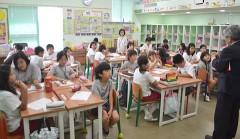AMICUS students publish a school paper about the reversion of Okinawa

On May 8, at the Okinawa AMICUS International in Enobi, Uruma, fifth-grade students listen to their principal Nakasuji (right).
May 11, 2012 Ryukyu Shimpo
On the occasion of the 40th anniversary of the reversion of Okinawa, fifth-grade students of the Okinawa AMICUS International published a school newspaper.
Twenty-seven students worked on the paper from mid-April and draw a comparison between Okinawa in the past and now. By studying about the reversion they are able to gain a perspective of the future of Okinawa and consider what role they should play by discussing the topic.
The students did some research around the keyword “1972.” They looked up books and used the Internet, also interviewing their families. Many of them were surprised that U.S. dollar had been used as currency in Okinawa and that Okinawan people needed a passport to travel to Japan. They wrote the article about what they found out in the research.
On May 8, the school principal, Kazuo Nakasuji, gave a lecture to the students. He was 27 year-old and taught in high school at the time of the reversion. The students asked Nakasuji how did he feel that the sovereignty of Okinawa changed to the U.S. and then back to Japan again. Nakasuji said, “Okinawa has accepted multicultural ideas and developed by our own efforts from the period of the Ryukyu Kingdom, and that spirit is still alive.” The students took notes attentively.
When the students were asked to imagine the future in 40 year’s time, many of them mentioned the U.S. military bases. There were various opinions such as: “I think we should keep the military bases to maintain the balance in our relations with our neighboring countries,” and “I believe that we should get rid of the bases and make them into forest for the indigenous animals of Okinawa.”
Homeroom teacher Joanna Kaoru Uezu said, “Reversion is such a difficult topic for the fifth-grade kids but it is important for them to talk about it. I hope that the students will be curious about issues related to Japan and the world, and see them as relevant to them by knowing about the Okinawan issue.”
(English translation by T&CT, Shinako Oyakawa and Mark Ealey)
Previous Article:American activist refers to Okinawa’s reversion to Japanese sovereignty with U.S. military presence intact as “fraud”
Next Article:Okinawa marks 40th anniversary of return to Japan Prime Minister pledges not to allow Futenma base to become a permanent fixture
[Similar Articles]
- “We hope to let people know about the Okinawa reversion movement,” ― Hentona High School Students make a film
- 90 percent of students in Miyako Island not using local dialect
- OPG publishes book to help elementary and junior high students learn Shimakutuba
- Okinawa Shogaku highlights benefits of making karate compulsory
- Community missing Takae junior high school closing after 68 years
 Webcam(Kokusai Street)
Webcam(Kokusai Street)


